10 Must-Have Skills for Customer Success Manager Duties
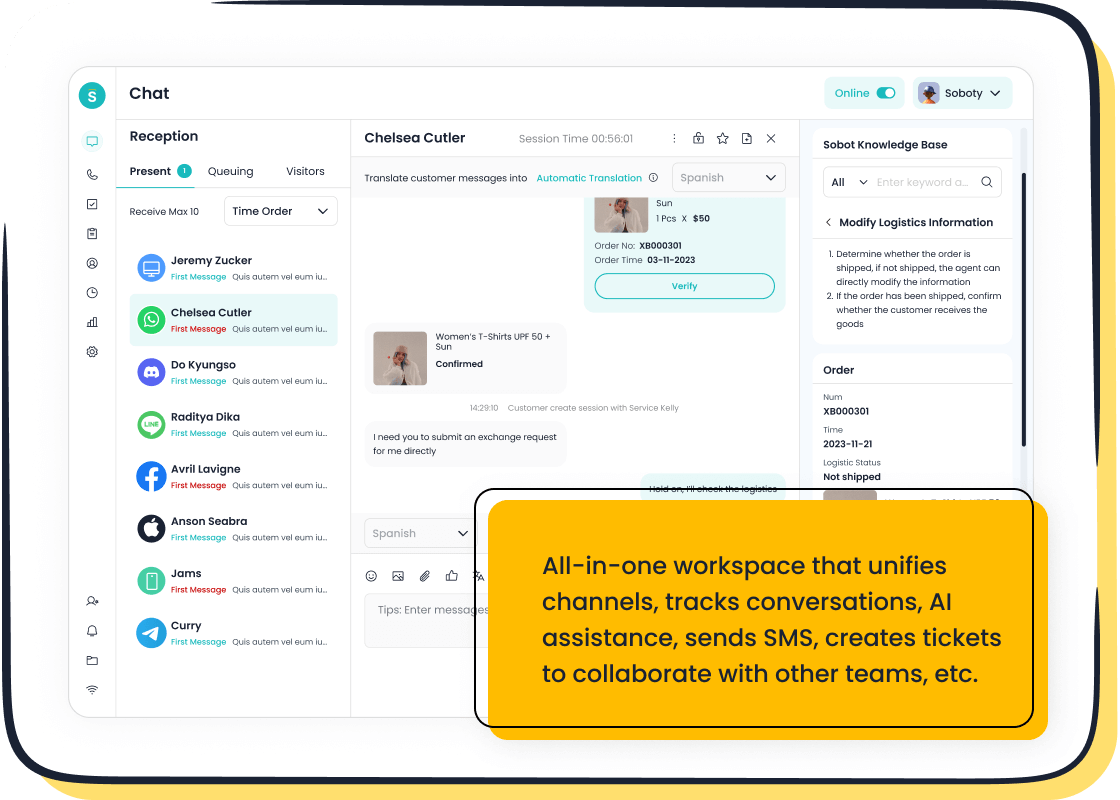
Customer success depends on mastering ten essential skills: communication, active listening, problem-solving, empathy, product knowledge, time management, relationship building, data analysis, conflict resolution, and adaptability. These skills drive customer satisfaction and help customer success managers excel in daily tasks and long-term growth.
Statistics show that 72% of customers share positive experiences with others, which highlights the value of strong customer success skills in building loyalty and advocacy. Sobot and Sobot AI support these efforts by streamlining customer success manager duties and improving results.
| Metric Description | Numerical Evidence |
|---|---|
| Growth in CSM role since 2015 | 736% increase |
| Percentage of CSMs advancing to leadership roles | Over 50% |
| Customer Advocacy - Referrals in 6 months | 100 referrals |
| Customer Health Monitoring - Issue ID time | 50% reduction |
Communication Skills
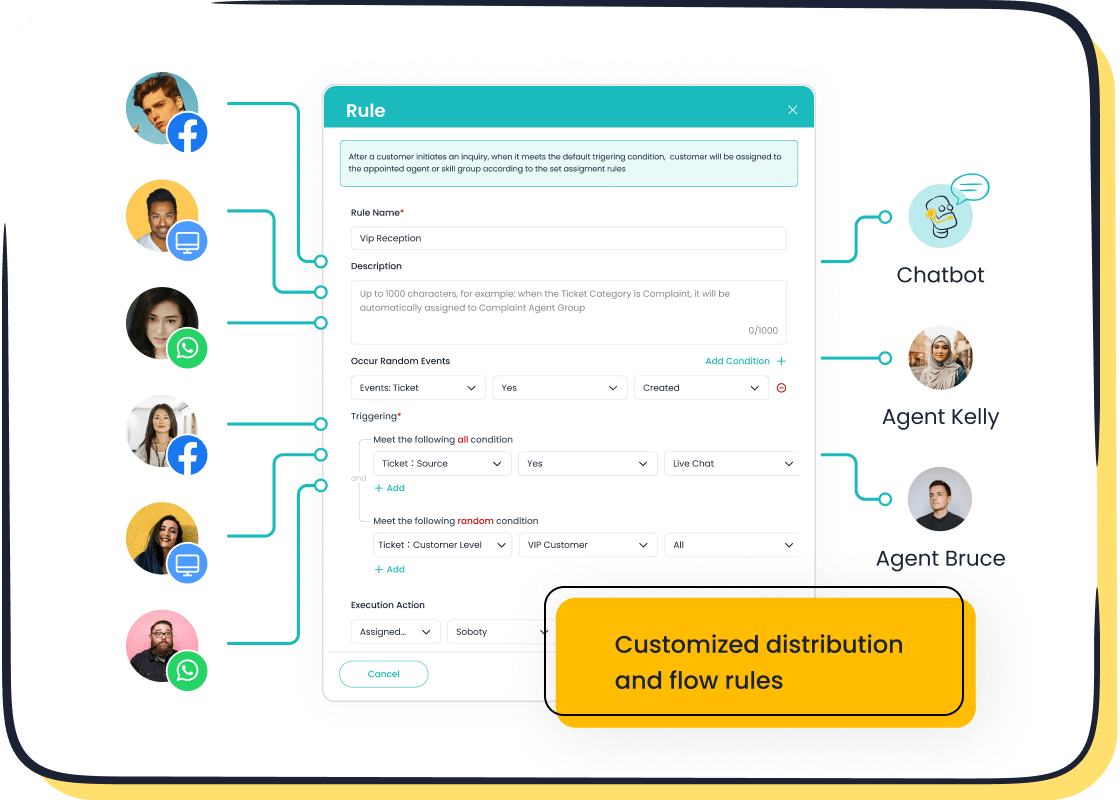
Customer Success Manager Duties
Customer success managers rely on communication skills to guide customers, resolve issues, and build trust. These professionals must explain complex ideas in simple terms and listen carefully to customer needs. Strong communication helps them set clear expectations and prevent misunderstandings. In daily customer success manager duties, they use communication to share updates, answer questions, and provide support.
Research shows that effective communication strategies, such as active listening and clear verbal cues, improve satisfaction and outcomes in service roles. For example, customer success managers who use proactive communication and timely interventions help customers reach their goals and reduce the risk of abandonment. Companies like Microsoft and ADP have seen measurable improvements in retention and revenue by investing in dedicated customer success communication teams.
Sobot Live Chat supports these duties by offering a unified workspace where customer success managers can track conversations across channels. This tool helps them respond quickly and keep all communication organized, which boosts efficiency and customer satisfaction.
Improving Communication
Improving communication is essential for customer success. Customer success managers can use several techniques to enhance their communication skills:
- Practice active listening to understand customer concerns.
- Use clear and concise language when explaining solutions.
- Personalize messages based on customer data and preferences.
- Provide regular updates to keep customers informed.
- Collect feedback through surveys and in-app tools.
These techniques help customer success managers build stronger relationships and identify upsell opportunities. Proactive communication, such as regular check-ins, allows them to resolve problems before they escalate. Collaboration with other teams ensures that customer pain points are addressed quickly.
Sobot’s omnichannel solution enables seamless communication by integrating chat, email, and social media into one platform. This integration allows customer success managers to deliver consistent service and improve customer outcomes. By mastering communication skills, they can drive product adoption, retention, and long-term loyalty.
Active Listening
Customer Success Skills
Active listening stands as a core skill for every customer success manager. This approach means focusing fully on the customer, understanding their needs, and responding thoughtfully. Research shows that 60% of business problems come from poor communication. Customer success managers who master active listening skills can prevent misunderstandings and build trust. They listen attentively, ask follow-up questions, and make sure customers feel valued before offering solutions.
Experts in customer success highlight that negotiation professionals ask questions 21% of the time, compared to only 10% for average people. This difference shows how listening and questioning drive better outcomes. Customer success manager skills improve when managers use empathetic listening to uncover customer goals and expectations. This method helps identify opportunities for upselling and cross-selling, which leads to higher retention and satisfaction. Sobot Live Chat supports these customer success skills by providing a unified workspace where managers can track conversations and gather feedback across channels. This tool helps managers respond quickly and ensures no customer concern goes unnoticed.
Listening Techniques
Customer success managers use several techniques to strengthen their active listening skills. They practice empathetic listening by giving customers their full attention and showing genuine interest. Simple actions, such as nodding or repeating key points, help customers feel heard. Managers also ask drill-down questions to clarify needs and uncover hidden issues.
Tip: Use open-ended questions like “Can you tell me more about your experience?” to encourage detailed responses.
A customer success manager can use Sobot’s built-in analytics to review customer feedback and spot trends. This data-driven approach helps managers address problems early and improve service quality. By applying these listening techniques, managers build stronger relationships and increase customer loyalty. Empathetic listening and active engagement lead to higher Customer Satisfaction (CSAT) and Net Promoter Scores (NPS), which are key measures of customer success.
Problem-Solving
Customer Success Manager Skills
Customer success managers rely on strong problem-solving skills to address customer challenges quickly and effectively. These professionals use a strategic approach to identify the root cause of each problem, analyze available data, and create actionable solutions. Customer success manager skills include gathering both quantitative and qualitative feedback, which helps teams understand trends and prioritize improvements. For example, customer success teams often collect support case volume data and combine it with feedback from calls. They present this information to product and R&D teams, ensuring that solutions align with customer needs and business goals.
A strategic mindset allows customer success managers to stack rank issues and focus on those with the greatest impact. This feedback loop improves retention and revenue by making sure that the most pressing problems receive attention. Customer success manager skills also include tracking key metrics to measure the effectiveness of problem-solving strategies.
| Metric | Definition | Impact on Problem-Solving Strategies | Real-World Example |
|---|---|---|---|
| Average Resolution Time (ART) | Average time to fully resolve a customer issue from ticket creation to closure | Lower ART indicates higher efficiency and productivity, enabling teams to resolve more cases and improve customer satisfaction | Reduced ART by 20% at an identity management company, boosting daily case resolution and customer satisfaction |
| First Response Time (FRT) | Time taken for an agent to respond to the initial customer inquiry | Faster FRT shows attentiveness and responsiveness, improving initial customer engagement and feedback | Reduced FRT from 4 hours to 30 minutes at a cloud computing company, increasing positive customer feedback by 15% |
| First Contact Resolution (FCR) | Percentage of cases resolved in the first interaction without follow-up | High FCR indicates agent effectiveness and product knowledge, reducing ticket volume and customer effort | Improved FCR by 10% at a fleet management company, reducing repeat tickets by 25% and freeing agent time |
| Customer Satisfaction Score (CSAT) | Customer rating of support experience, typically on a 1-5 scale | High CSAT reflects quality of support, communication, and solution thoroughness, directly linked to customer loyalty | Training program at a network optimization company increased CSAT by 15%, showing impact of agent development |
Solutions in Action
Customer success managers put their problem-solving skills into action by using strategic tools and processes. Sobot’s unified workspace helps managers track customer issues across channels, making it easier to spot patterns and resolve problems faster. AI-powered analytics in Sobot Live Chat highlight common pain points and suggest solutions, which improves both efficiency and customer satisfaction.
Customer feedback often reveals hidden problems that metrics alone cannot show. Voice of the Customer programs, for example, have led to a 30% drop in escalations and higher satisfaction by encouraging proactive communication. AI analysis of support transcripts can identify confusing language, leading to better communication and stronger customer relationships.
The impact of these solutions is clear. Enterprise clients have seen a 30% increase in client retention and a 25% rise in upsell opportunities. Small businesses have reduced support ticket resolution time by 30% and accelerated time to value by 40%. These results show how strategic problem-solving drives customer success.
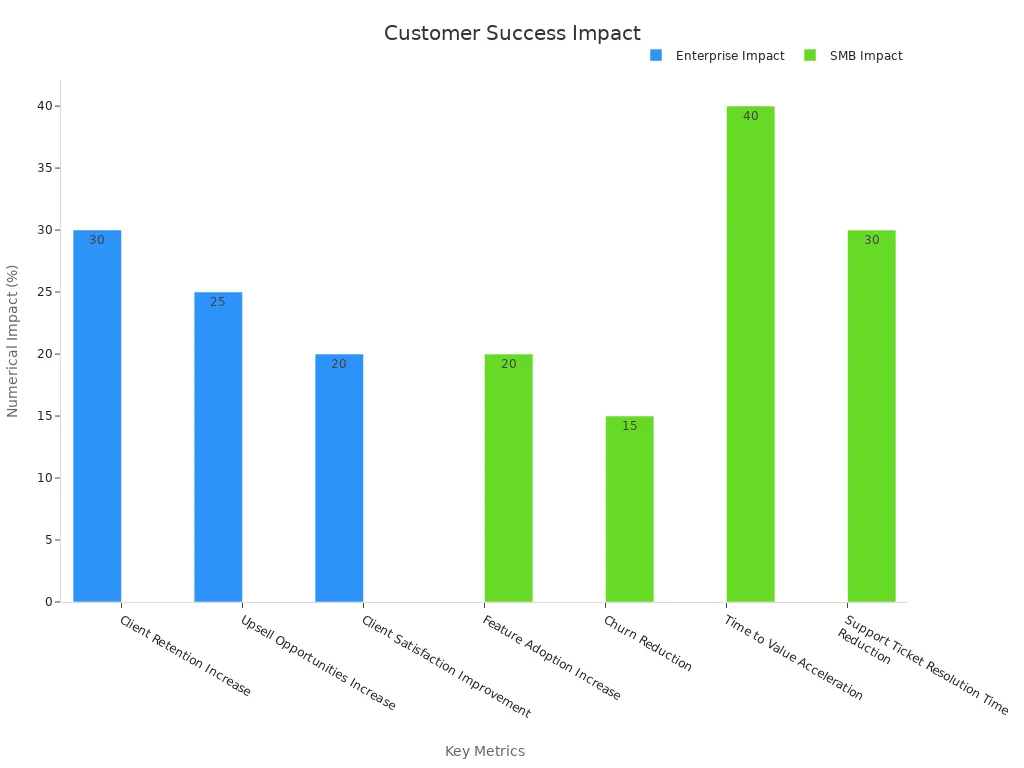
Empathy
Customer Success Management
Empathy stands at the heart of customer success management. This skill allows managers to understand and respond to customer emotions, which leads to better outcomes. When teams show empathy, they create a customer-centric mindset that puts the customer first. Relational cultural theory highlights empathy as a foundation for trust and positive relationships. In customer success, managers who listen and acknowledge feelings help customers feel valued. This approach uncovers hidden needs and improves the customer experience.
A focus on empathy also benefits employees. Teams that practice empathy report higher morale and lower turnover. Regular training in empathetic communication ensures consistent service. Sobot supports customer success management by providing tools like Live Chat, which enables agents to track conversations and respond with care. These features help teams deliver personalized support and build lasting relationships.
| Benefit / Tip | Explanation |
|---|---|
| Helps Build Trust | Empathy enables customers to feel heard and understood, increasing loyalty. |
| Diffuses Difficult Situations | Acknowledging emotions calms interactions and prevents escalation. |
| Leads to Customer Satisfaction | Customers feel listened to, boosting satisfaction and word-of-mouth. |
| Reduces Customer Churn | Personalized responses prevent frustration and customer loss. |
| Uncovers Underlying Issues | Active listening helps identify deeper customer needs for better solutions. |
Building Trust
Building trust requires a customer-centric mindset and strong empathy skills. Leading companies like Disney and Zappos use empathetic communication to create emotional connections. Disney seeks feedback and crafts immersive experiences, resulting in unmatched loyalty. Zappos empowers employees to offer 24/7 support and free returns, which leads to strong advocacy.
| Company | Empathetic Communication Strategies | Trust-Building Outcomes |
|---|---|---|
| Disney | Emotional connections; immersive environments; seeks feedback | Unmatched customer loyalty |
| Zappos | Customer-centric culture; 24/7 support; free returns | Strong loyalty and advocacy |
| Southwest Airlines | Friendly, personalized service; transparent pricing | Builds trust and loyalty |
| Ritz-Carlton | Empowers employees; attention to detail | Fosters brand loyalty through exceptional service |
Sobot’s omnichannel solution helps customer success teams follow up and provide emotional support across channels. By using these tools, managers can check in with customers, take responsibility for mistakes, and ensure satisfaction. These actions build trust and drive long-term customer success.
Product Knowledge
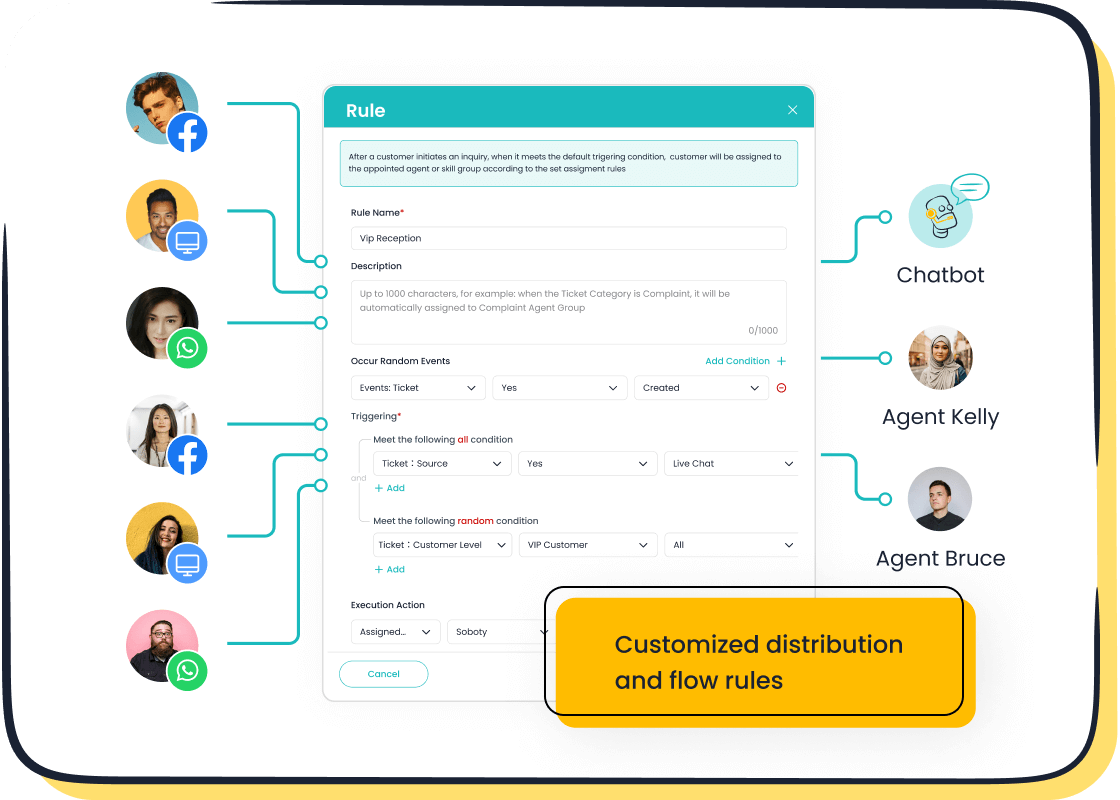
Sobot Live Chat Integration
Customer success managers must possess strong product knowledge to deliver outstanding customer experiences. Sobot Live Chat serves as a powerful tool for deepening this knowledge. Its unified workspace brings together customer conversations, product details, and analytics in one place. This integration allows managers to access up-to-date information quickly, answer questions accurately, and resolve issues efficiently.
Many businesses report measurable improvements after integrating Sobot Live Chat into their customer success strategies. For example, 90% of companies experience faster complaint resolution, and 80% handle higher call volumes with ease. Customer support satisfaction scores rise by 24%, while positive feedback rates exceed 96%. The OPPO case study demonstrates these benefits clearly. By using Sobot’s chatbot, OPPO resolved 83% of customer queries automatically, leading to a 57% increase in repurchase rates and a 94% positive feedback rate. These results show how Sobot Live Chat empowers teams to deliver knowledgeable, timely support that builds loyalty.
| Metric Description | Improvement/Value |
|---|---|
| Faster complaint resolution | 90% of businesses |
| Customer support satisfaction score increase | 24% increase |
| Positive feedback rate | Over 96% |
| Repurchase rate increase (OPPO case study) | 57% |
Customer Success Manager Duties
Customer success manager duties include guiding customers through onboarding, answering technical questions, and recommending solutions. Deep product knowledge enables managers to perform these tasks with confidence. When managers understand every feature and benefit, they can tailor support to each customer’s needs. This expertise leads to higher first contact resolution rates and shorter average handle times.
A well-informed customer success manager uses Sobot’s analytics to track common issues and identify knowledge gaps. This data-driven approach helps teams update training materials and improve the customer experience. Studies show that 81% of consumers value quality service rooted in strong product knowledge. Managers who master this skill boost customer satisfaction, trust, and loyalty. They also increase upsell and cross-sell success by recommending relevant products during customer interactions.
Tip: Regularly review product updates and use Sobot’s knowledge base to stay current. This habit ensures that every customer receives accurate, helpful information.
Time Management
Customer Success Manager
Time management stands as a vital skill for every customer success manager. These professionals often juggle multiple tasks, such as onboarding new clients, responding to support tickets, and tracking customer health. Studies show that effective time management can boost productivity by up to 25% (source). Customer success managers who master these skills can handle more accounts and deliver better service. They prioritize urgent issues, schedule regular check-ins, and set clear goals for each day. Sobot’s unified workspace helps managers organize conversations and tasks in one place, reducing time spent switching between platforms. This efficiency allows teams to focus on building relationships and solving problems quickly.
Organization Tips
Customer success managers use several organization tips to improve their time management skills. They often rely on digital tools, such as Sobot Live Chat, to centralize customer data and automate routine tasks. This approach saves time and reduces errors. Managers create daily or weekly to-do lists, breaking large projects into smaller steps. They block specific times for meetings, follow-ups, and training. Many use calendar reminders to avoid missing important deadlines.
Tip: Set aside 10 minutes at the end of each day to review progress and plan for tomorrow. This habit helps managers stay on track and adjust priorities as needed.
A well-organized customer success manager can respond faster to customer needs and prevent issues from escalating. By using these skills, teams increase customer satisfaction and drive long-term loyalty.
Relationship Building
Customer Success Skills
Relationship building stands at the core of customer success skills. Customer success managers use these skills to create trust, encourage open communication, and foster collaboration with clients. Strong customer relationships help teams understand customer needs and deliver personalized solutions. Strategic use of customer success skills, such as attentive listening and proactive support, leads to higher customer satisfaction and retention.
Research shows that companies focusing on relationship building see measurable results. For example, 88% of customers who trust a store return as repeat buyers. Consistent branding and personalized experiences also play a key role in loyalty. The table below highlights how relationship building impacts customer retention and loyalty:
| Statistic | Explanation |
|---|---|
| 88% of customers who trust a store return as repeat buyers | Trust is fundamental in fostering long-term customer loyalty, showing that relationship building through trust leads to repeat purchases. |
| 54% of customer-obsessed companies experience better loyalty and retention from omnichannel efforts | Personalized and consistent experiences across channels enhance loyalty, highlighting the role of relationship marketing strategies. |
| 47% of customers express loyalty by recommending brands to friends and family | Word-of-mouth driven by positive relationships is a key driver of sustained loyalty and customer acquisition. |
| 28% of consumers cite consistent branding as important for loyalty | Consistency in brand messaging strengthens customer connection and loyalty. |
| Current customers spend 67% more on average than new customers | Long-term relationships increase customer lifetime value and revenue. |
| Increasing retention rates by 5% can increase profits by 25% to 95% | Small improvements in loyalty through relationship building have significant financial impact. |
| Loyal customers are 64% more likely to purchase frequently and 31% more willing to pay higher prices | Loyalty driven by strong relationships increases purchase frequency and willingness to pay more, supporting sustainable growth. |
Long-Term Loyalty
Long-term loyalty grows from strategic relationship building and continuous collaboration. Customer success teams use analytics to track Net Promoter Score (NPS), Customer Satisfaction Score (CSAT), and customer health scores. These metrics help identify at-risk customers and guide strategic interventions. Companies that monitor and improve these scores see higher retention and stronger customer relationships.
Note: Dimension Data reports that 84% of companies improving customer experience see increased revenue, showing a direct link between customer success and financial performance.
Sobot’s omnichannel solution supports relationship building by unifying customer interactions across channels. This approach ensures consistent messaging and enables teams to deliver a seamless customer experience. As a result, customer retention improves, and customers become more likely to recommend the brand to others.
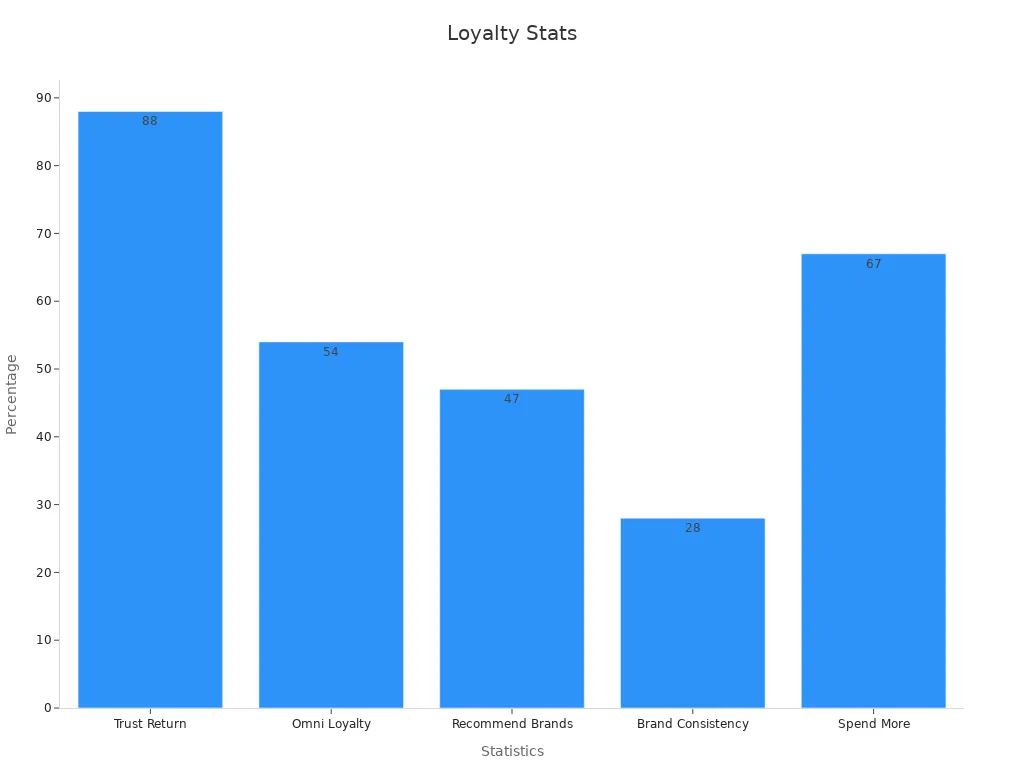
Relationship marketing shifts the focus from single transactions to building lasting customer bonds. This strategy increases customer lifetime value and gives companies a competitive edge in a crowded market.
Data Analysis

Sobot Omnichannel Solution
Sobot Omnichannel Solution empowers customer success teams with advanced analytics and AI-driven automation. These tools track key metrics such as customer satisfaction scores (CSAT), first response time, and net promoter score (NPS). Sobot’s analytics framework uses behavioral analysis, predictive modeling, and sentiment analysis to help businesses understand customer behavior and forecast satisfaction trends. AI-powered chatbots provide 24/7 support, automate repetitive tasks, and personalize interactions. This approach improves customer retention and reduces operational costs. Companies using Sobot have seen up to 91% year-over-year increases in customer retention rates. By integrating with CRM systems, Sobot creates unified customer profiles, enabling context-aware support and strategic engagement across all channels.
Note: AI is projected to power 95% of customer interactions by 2025, making data-driven customer success management more important than ever.
Customer Success Management
Data analysis stands at the core of effective customer success management. Customer success managers use analytics to monitor performance, identify trends, and make strategic decisions. Sobot’s built-in analytics help managers track metrics like churn rate, CSAT, customer lifetime value (CLV), and onboarding engagement rate. These insights allow teams to spot at-risk customers, improve onboarding, and increase expansion revenue. For example, a high CSAT score signals strong customer satisfaction, while a low score highlights areas needing attention. Predictive analytics enable proactive support, reducing churn and boosting loyalty.
| Metric | Significance | Calculation Method | Example |
|---|---|---|---|
| Churn Rate | Shows percentage of customers leaving, indicating dissatisfaction. | (Customers lost / Total customers) × 100 | Lower churn rate means higher loyalty. |
| Customer Satisfaction Score (CSAT) | Measures happiness and loyalty through feedback. | Average satisfaction score from customer ratings (e.g., 1-5 scale). | High CSAT after support shows effective service. |
| Customer Lifetime Value (CLV) | Predicts total revenue from a customer over time. | Average purchase value × Frequency × Lifetime | Higher CLV means better retention and value. |
| Net Promoter Score (NPS) | Measures loyalty and likelihood to recommend. | Promoters minus detractors on a 1-10 scale | Higher NPS means more repeat purchases and advocacy. |
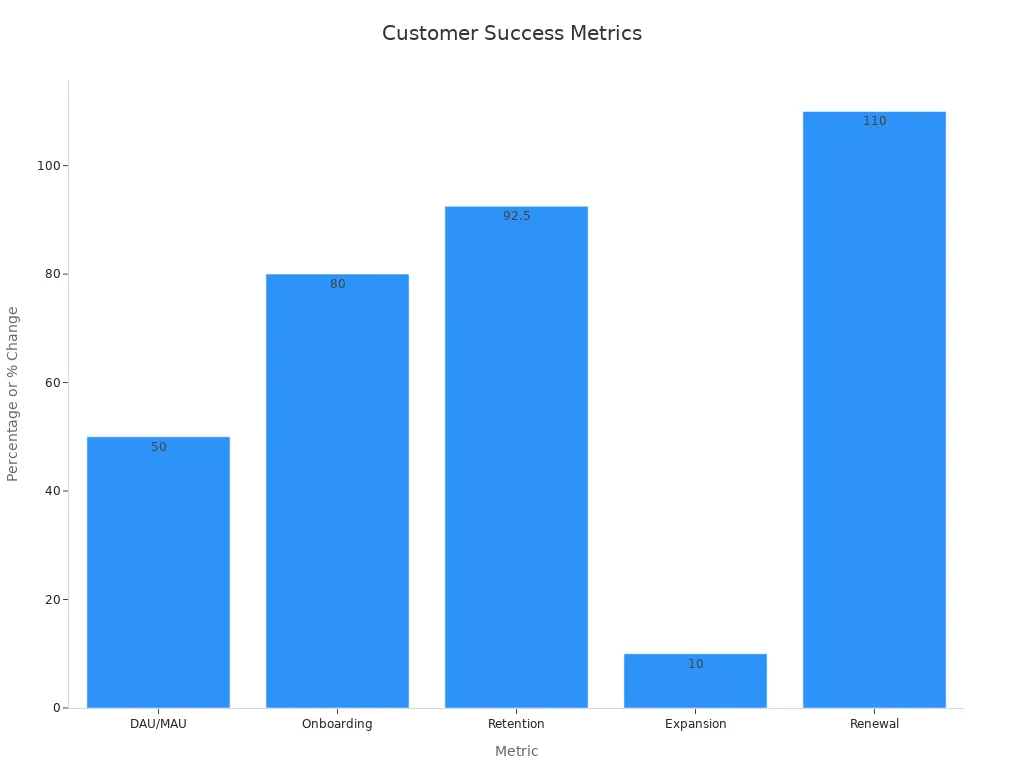
Customer success manager duties require strong data analysis skills. By leveraging Sobot’s omnichannel analytics, teams can deliver strategic, personalized support that drives customer success, loyalty, and long-term growth.
Conflict Resolution
Customer Success Manager Skills
Conflict resolution stands as a vital part of customer success manager skills. Every customer success manager faces situations where customers feel frustrated or dissatisfied. These moments test the ability to remain calm, listen actively, and guide conversations toward positive outcomes. Strong conflict resolution skills help turn a negative experience into an opportunity for building trust. Teams that invest in structured conflict resolution strategies see consistent and effective customer interactions.
Training in conflict resolution equips customer success managers with the right skills to de-escalate tense situations. This training prepares teams for complex scenarios and helps them handle disputes with confidence. The following outcomes highlight the benefits of conflict resolution training for customer success:
- Teams learn to manage disputes and reduce escalation.
- Managers develop better decision-making abilities.
- Upset customers often become loyal patrons after positive resolution.
- Relationships grow stronger through trust and respect.
- Teams handle complex problems with greater ease.
| Outcome | Percentage of Employees Reporting Positive Impact |
|---|---|
| Enhanced Understanding Among Employees | 41% |
| Improved Relationships | 33% |
| Superior Problem-Solving | 29% |
| Increased Team Performance | 21% |
| Boosted Motivation | 18% |
| Innovation and New Ideas | 9% |
| Positive Outcomes from Conflict Training | 19% |
Handling Challenges
Customer success managers encounter many challenges each day. They must address customer complaints, resolve misunderstandings, and manage expectations. Effective conflict resolution skills allow them to approach each problem with a clear mind and a calm attitude. Sobot’s omnichannel solution supports these efforts by providing a unified workspace for tracking conversations and managing disputes across channels.
Managers who master conflict resolution can turn difficult situations into learning experiences. They use active listening, empathy, and clear communication to find solutions that satisfy both the customer and the business. These skills lead to higher customer satisfaction and stronger loyalty. Research shows that conflict resolution training leads to:
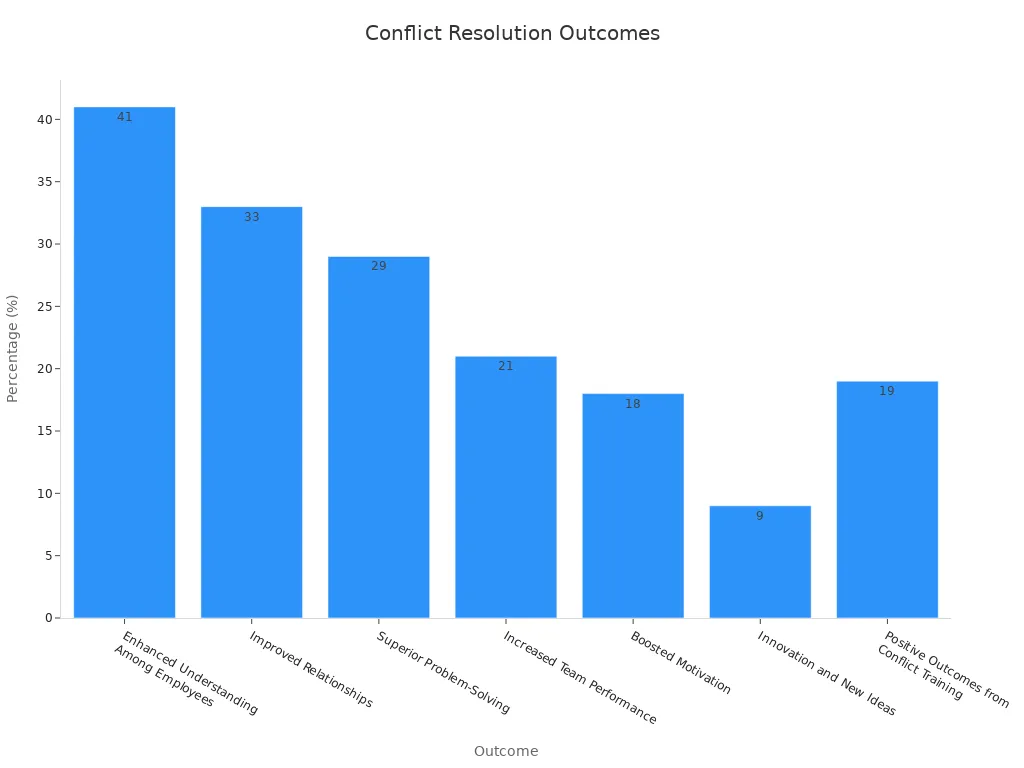
Customer success manager skills in conflict resolution not only solve immediate problems but also prevent future issues. By fostering trust and respect, they create a positive environment for both customers and teams.
Adaptability
Customer Success Management
Adaptability stands as a core requirement in customer success management. Teams face changing customer needs, new technologies, and evolving business goals. Customer success managers must adjust their strategies quickly to keep customers satisfied. They track key metrics like customer health scores, product usage, and satisfaction scores (CSAT) to spot trends and risks. Automated alerts help managers act fast when usage drops or when customers show signs of churn.
Managers use a mix of quantitative data and feedback from their teams to create flexible re-engagement plans. For example, a manager might reach out to a customer after noticing a sudden dip in product usage, preventing revenue loss and building trust. Sobot’s omnichannel solution supports this process by unifying data from chat, email, and social media. This unified view helps managers personalize outreach and address pain points quickly.
Tip: Align customer success goals with business objectives. Use onboarding checklists, proactive support, and automation tools like Sobot Live Chat to scale efforts and improve retention.
| Metric Tracked | Purpose | Example Action |
|---|---|---|
| Customer Health Score | Identify at-risk customers | Proactive outreach |
| Product Usage | Monitor engagement | Offer training or resources |
| CSAT | Measure satisfaction | Adjust support approach |
| Billing Data | Spot payment issues | Send reminders or offer solutions |
Continuous Learning
Continuous learning strengthens adaptability in customer success. Research from Deloitte shows that companies with a learning culture are 92% more likely to innovate and see a 37% boost in productivity (source). Customer success professionals who build new skills can solve complex problems and deliver better results.
Managers encourage their teams to join webinars, complete certifications, and participate in mentorship programs. Certifications like Customer Success Manager (CSM) and CCSP validate expertise and open doors for career growth. Sobot supports continuous learning by offering training resources and analytics that help teams measure progress. Open communication about learning opportunities keeps teams engaged and motivated.
Note: Regularly review KPIs such as retention rates and NPS to measure the impact of learning initiatives on customer success management.
Skill Development
Improving Customer Success Skills
Customer success professionals must commit to ongoing skill development to stay effective. The landscape of customer needs and technology changes quickly. Regular training and peer learning help teams adapt and grow. Internal peer learning methods, such as team meetings, peer coaching, and office hours, foster collaboration and continuous improvement. Customer-focused opportunities like live training events, user groups, and discussion forums also drive engagement and knowledge sharing. These approaches lead to better outcomes, higher adoption rates, and improved satisfaction. Teams that prioritize skill development see reduced churn and more predictable revenue.
Sobot supports customer success teams with a range of resources. The platform offers built-in training modules, live webinars, and a comprehensive knowledge base. These tools help agents learn new customer success methodologies and sharpen their skills. Sobot’s unified workspace allows managers to integrate learning into daily routines, making development part of the workflow. By scheduling regular learning time and using microlearning techniques, teams can fit training into busy schedules.
Tip: Set clear learning goals and use feedback from managers to track progress. This strategy builds accountability and ensures continuous improvement.
Resources and Training
Access to diverse resources and structured training is essential for customer success. Teams benefit from online courses, workshops, and mentorship programs. Sobot provides free webinars and LMS content, helping teams optimize both time and cost. Measuring the impact of training through employee feedback and performance metrics ensures that learning translates into real results.
The OPPO case study highlights the value of ongoing skill development. By leveraging Sobot’s chatbot and ticketing system, OPPO’s team improved efficiency and customer satisfaction. The company achieved an 83% chatbot resolution rate and a 94% positive feedback rate. This success shows how investing in customer success skills and leveraging the right resources can drive measurable business outcomes.
Note: Continuous learning and strategic use of resources help customer success professionals build critical skills and advance in their roles.
Mastering these 10 customer success manager skills drives customer success and long-term business growth. Companies that invest in customer success see higher customer satisfaction, loyalty, and profitability. The table below shows how strong customer success programs deliver measurable results:
| Statistic | Description | Business Outcome Impact |
|---|---|---|
| 91% ROI over 3 years | Customer Success programs yield high returns by improving retention and reducing churn. | Significant financial benefit |
| 5% increase in retention | Small gains in retention can boost profits by up to 95%. | Direct link to profitability |
| Loyal customers worth 10x first purchase | Long-term relationships increase lifetime value. | Higher revenue per customer |
Sobot’s unified workspace and analytics help teams identify every problem, improve customer satisfaction, and support ongoing skill development. Teams should assess their customer success skills, set growth goals, and use Sobot’s resources for continuous improvement.
FAQ
What are the most important customer success manager skills?
Customer success manager skills include communication, active listening, problem-solving, empathy, product knowledge, and data analysis. These skills help teams build trust, solve issues, and improve customer satisfaction. Sobot’s unified workspace supports these skills by organizing conversations and providing real-time analytics.
How does Sobot help with customer success manager duties?
Sobot offers tools like Live Chat and an omnichannel solution. These features help customer success managers track customer interactions, automate routine tasks, and analyze data. Teams using Sobot report faster response times and higher customer satisfaction scores.
Why is product knowledge vital for customer success managers?
Product knowledge allows customer success managers to answer questions quickly and recommend solutions. Teams with strong product knowledge resolve issues faster and increase customer loyalty. Sobot’s knowledge base and analytics help managers stay updated and deliver accurate support.
How can customer success manager skills reduce customer churn?
Customer success manager skills such as empathy, active listening, and conflict resolution help teams understand customer needs and address problems early. Sobot’s analytics identify at-risk customers, allowing managers to take action and improve retention rates.
What training resources does Sobot provide for customer success teams?
Sobot offers webinars, a knowledge base, and built-in training modules. These resources help customer success managers develop new skills and stay current with industry trends. Teams using Sobot’s training tools see measurable improvements in customer success manager duties and performance.
See Also
Best Customer Service Software Solutions To Try In 2024
Effective Strategies For Managing Call Center Quality
How To Successfully Deploy Omnichannel Contact Centers
